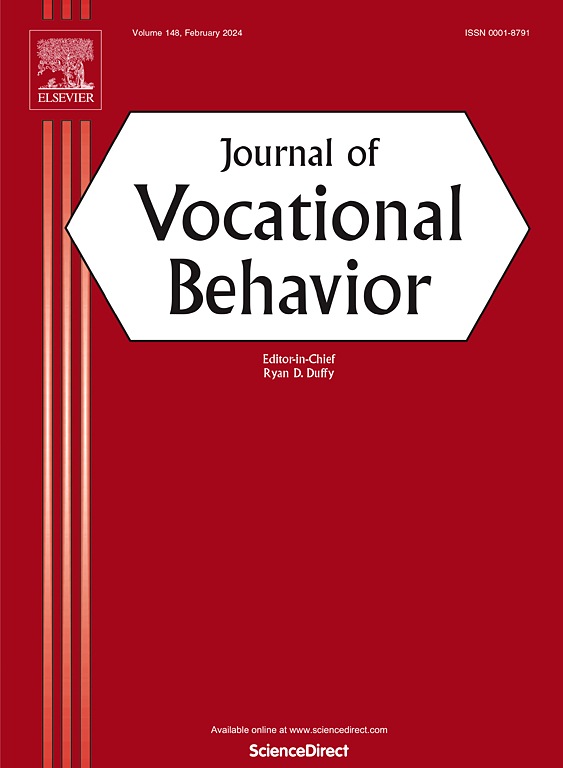内部变化:关键社会认知职业理论构念的内部变化与一年级工程专业学生坚持意向的关系
IF 5.2
1区 心理学
Q1 PSYCHOLOGY, APPLIED
引用次数: 0
摘要
工程领域正在经历对工程师不断增长的需求和劳动力市场新进入者的供应之间的差距。社会认知职业理论(SCCT)长期以来一直被用来模拟学生在工程领域的坚持。然而,几乎所有先前的研究都是利用学生之间的差异,而不是学生内部随时间的变化来预测持久性。为了解决这一差距,我们在四个时间点测量了社会认知职业理论(SCCT)的显著构念,即自我效能感、结果期望和对工程的兴趣,以探索持久意图与个体学生中这些构念的变化之间的关系。参与者在他们的工程项目学习的第一学期注册了入门工程课程。使用层次线性模型,通过学生之间在自我效能、结果预期和兴趣方面的差异,以及重要的在同一套预测因子中随着时间的推移的个人差异,预测了他们第一学期的工程坚持意图。我们发现,学生内部的自我效能感和个人内部的结果预期在统计上是持久性意图的显著预测因素,这些关系的强度随着时间的推移而变化。本文章由计算机程序翻译,如有差异,请以英文原文为准。
Changes within: How within-person changes on key social cognitive career theory constructs relate to first-year engineering student persistence intentions
The engineering field is experiencing a disparity between the growing demand for engineers and the supply of new entrants into the labor market. Social Cognitive Career Theory (SCCT) has long been used to model student persistence in engineering. However, almost all prior studies use differences between students and not changes within students over time to predict persistence. To address this gap, we measured salient Social Cognitive Career Theory (SCCT) constructs, namely self-efficacy, outcome expectations, and interest in engineering, at four time points to explore the relationship between persistence intentions and changes in those constructs within individual students. Participants were enrolled in introductory engineering courses during their first semester of their engineering program of study. Using hierarchical linear modeling, engineering persistence intentions over their first semester were predicted from between-student differences in self-efficacy, outcome expectations, and interest and importantly within-person differences over time in the same suite of predictors. We found that within-student self-efficacy and within-person outcome expectations were statistically significant predictors of persistence intentions, with the strength of these relationships changing over time.
求助全文
通过发布文献求助,成功后即可免费获取论文全文。
去求助
来源期刊

Journal of Vocational Behavior
PSYCHOLOGY, APPLIED-
CiteScore
13.10
自引率
5.40%
发文量
85
期刊介绍:
The Journal of Vocational Behavior publishes original empirical and theoretical articles offering unique insights into the realms of career choice, career development, and work adjustment across the lifespan. These contributions are not only valuable for academic exploration but also find applications in counseling and career development programs across diverse sectors such as colleges, universities, business, industry, government, and the military.
The primary focus of the journal centers on individual decision-making regarding work and careers, prioritizing investigations into personal career choices rather than organizational or employer-level variables. Example topics encompass a broad range, from initial career choices (e.g., choice of major, initial work or organization selection, organizational attraction) to the development of a career, work transitions, work-family management, and attitudes within the workplace (such as work commitment, multiple role management, and turnover).
 求助内容:
求助内容: 应助结果提醒方式:
应助结果提醒方式:


